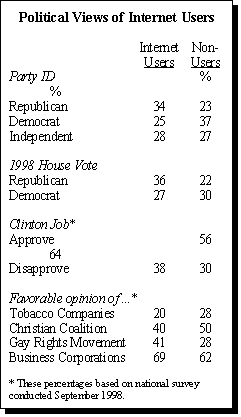Americans who use the Internet are substantially more informed than non-users about current events, and politically they are slightly more conservative. There also is no association between Internet use and diminished social connections.
 In fact, Americans who go online are more likely than those who do not to have visited with friends or family members on a typical weekday, to say they have many people they can turn to for help when needed, and to say that most people can be trusted. These differences in some cases reflect the higher socio-economic status of Internet users as a group. But even when factors like education and income are taken into account, Internet users are no less likely than non-users to say they have many people they can turn to or that they can trust most people.
In fact, Americans who go online are more likely than those who do not to have visited with friends or family members on a typical weekday, to say they have many people they can turn to for help when needed, and to say that most people can be trusted. These differences in some cases reflect the higher socio-economic status of Internet users as a group. But even when factors like education and income are taken into account, Internet users are no less likely than non-users to say they have many people they can turn to or that they can trust most people.
Republican Leaning, But Social Moderates
Internet users lean to the Republican Party in greater numbers, while non-users are disproportionately Democrats. More than one-third of those who go online (34%) are Republicans compared to 25% who are Democrats. Among those who do not use the Internet, 23% are Republicans and 37% are Democrats. These partisan differences are evident even when factors like income and education are taken into account.
 Internet users voted for Republican candidates in greater numbers than did non-users in the 1998 elections, and those who go online are slightly more critical of President Clinton. Non-users approved of the way Clinton was handling his job by a 64%-30% margin in a September poll, for example, while Internet users were more narrowly divided, 56%-38%.
Internet users voted for Republican candidates in greater numbers than did non-users in the 1998 elections, and those who go online are slightly more critical of President Clinton. Non-users approved of the way Clinton was handling his job by a 64%-30% margin in a September poll, for example, while Internet users were more narrowly divided, 56%-38%.
But on some social issues, Internet users as a group are more moderate than Americans who do not go online. Internet users are significantly less favorable toward tobacco companies and the Christian Coalition, for example, and more favorable than non-users toward the gay rights movement. Users and non-users tend to distrust the federal government — more than 70% of both groups say they trust the federal government only some of the time or never.
Internet users are also substantially better informed than non-users, particularly about high-technology news topics — again, even when the higher education and income levels of Internet users are taken into account. For example, twice as many Internet users as non-users could identify Microsoft as the company involved in a federal antitrust suit (75% vs. 35%). Similarly, more Internet users than non-users knew the Republicans are the majority party in Congress (68% vs. 50%) and that “.ORG” at the end of a website address mean the site is typically sponsored by a non-profit organization (35% vs. 8%). Americans who go online also say they voted in the 1998 elections in greater numbers (61% among Internet users, compared to 51% among non-users).
The Internet’s impact on society also divides users and non-users. Fully 75% of those who go online say the Internet is a good thing because it brings together people with similar interests, while just 14% say the Internet is bad because it can bring together small groups of people with dangerous ideas. Among Americans who do not go online, just 42% say the Internet is a good thing, while 37% worry that it is bad.
Those who do not go online also express concerns that the Internet is replacing more personal communication among people. More than half of non-users (57%) say the disadvantage of online communications not being face-to-face overshadows the advantages of allowing people to meet and stay in touch. In contrast, two-thirds of Internet users (67%) say the advantages of the Internet outweigh the disadvantages.
At the same time, people who don’t go online express little concern that they are missing out on something. Just 17% of non-users say they worry a great deal or a fair amount about what they are missing by not going online — indeed, 57% say they aren’t worried at all. Younger people express slightly more concern than do older people. Some 23% of non-users under age 30 say they worry at least a fair amount about what they are missing, compared to 13% of non-users who are age 50 or older.


